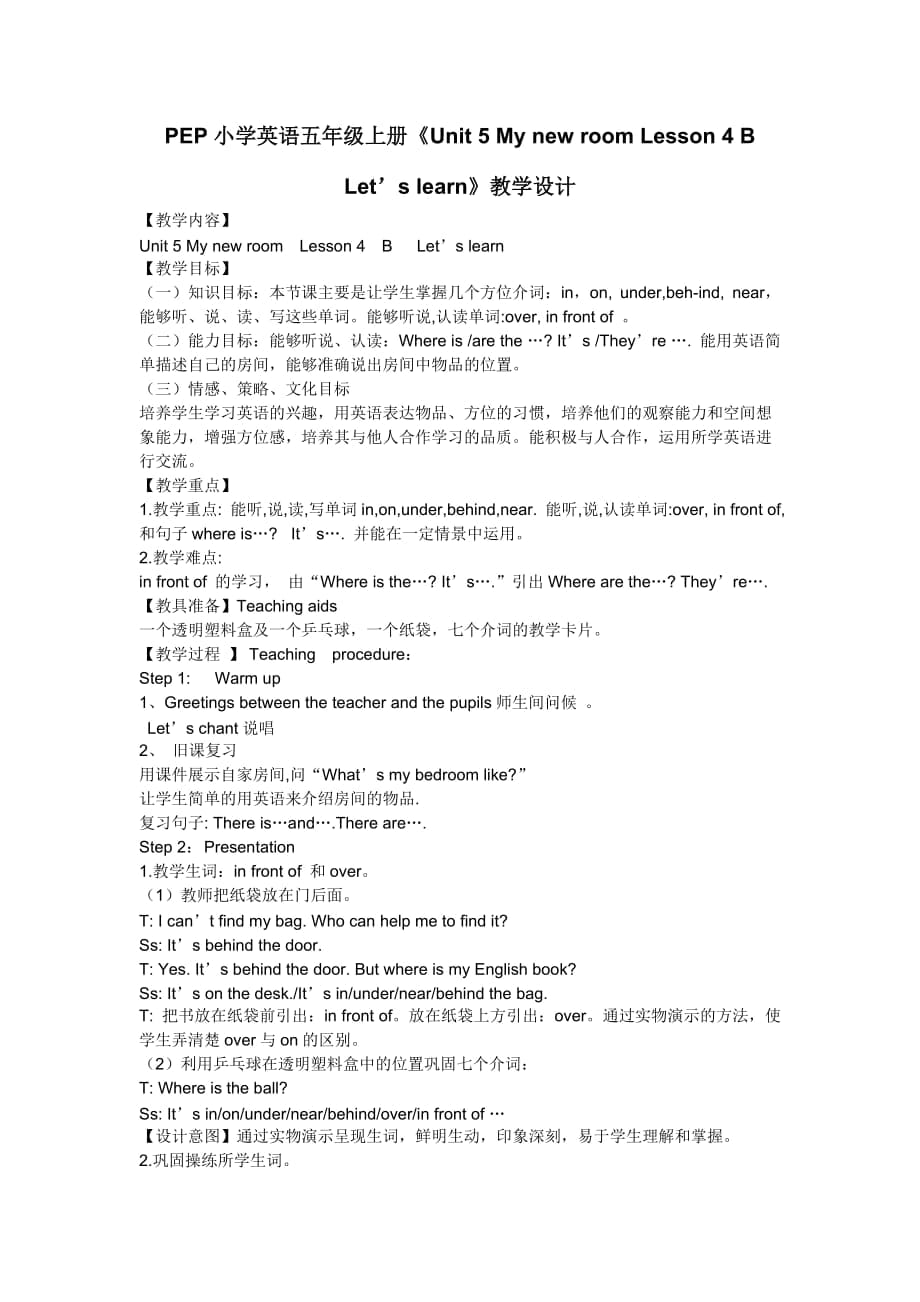《PEP小學(xué)英語(yǔ)五年級(jí)上冊(cè)《Unit 5 My new room Lesson 4 B Let’s learn》教學(xué)設(shè)計(jì)》由會(huì)員分享��,可在線閱讀,更多相關(guān)《PEP小學(xué)英語(yǔ)五年級(jí)上冊(cè)《Unit 5 My new room Lesson 4 B Let’s learn》教學(xué)設(shè)計(jì)(2頁(yè)珍藏版)》請(qǐng)?jiān)谘b配圖網(wǎng)上搜索��。
1���、
PEP小學(xué)英語(yǔ)五年級(jí)上冊(cè)《Unit 5 My new room Lesson 4 B Let’s learn》教學(xué)設(shè)計(jì)
【教學(xué)內(nèi)容】
Unit 5 My new room Lesson 4 B Let’s learn
【教學(xué)目標(biāo)】
(一)知識(shí)目標(biāo):本節(jié)課主要是讓學(xué)生掌握幾個(gè)方位介詞:in�����,on, under,beh-ind, near����,能夠聽(tīng)����、說(shuō)����、讀、寫這些單詞�����。能夠聽(tīng)說(shuō),認(rèn)讀單詞:over, in front of �����。
(二)能力目標(biāo):能夠聽(tīng)說(shuō)、認(rèn)讀:Where is /are the …? It’s /They’re …. 能用英語(yǔ)簡(jiǎn)單描述自己的房間�����,能夠準(zhǔn)確說(shuō)出房間
2��、中物品的位置���。
(三)情感����、策略���、文化目標(biāo)
培養(yǎng)學(xué)生學(xué)習(xí)英語(yǔ)的興趣��,用英語(yǔ)表達(dá)物品��、方位的習(xí)慣���,培養(yǎng)他們的觀察能力和空間想象能力,增強(qiáng)方位感����,培養(yǎng)其與他人合作學(xué)習(xí)的品質(zhì)���。能積極與人合作,運(yùn)用所學(xué)英語(yǔ)進(jìn)行交流��。
【教學(xué)重點(diǎn)】
1.教學(xué)重點(diǎn): 能聽(tīng),說(shuō),讀,寫單詞in,on,under,behind,near. 能聽(tīng),說(shuō),認(rèn)讀單詞:over, in front of, 和句子where is…? It’s…. 并能在一定情景中運(yùn)用����。
2.教學(xué)難點(diǎn):
in front of 的學(xué)習(xí), 由“Where is the…? It’s….”引出Where are the…? They’re…
3����、.
【教具準(zhǔn)備】Teaching aids
一個(gè)透明塑料盒及一個(gè)乒乓球,一個(gè)紙袋���,七個(gè)介詞的教學(xué)卡片。
【教學(xué)過(guò)程 】 Teaching procedure:
Step 1: Warm up
1�����、Greetings between the teacher and the pupils師生間問(wèn)候 ��。
Let’s chant說(shuō)唱
2�����、 舊課復(fù)習(xí)
用課件展示自家房間,問(wèn)“What’s my bedroom like?”
讓學(xué)生簡(jiǎn)單的用英語(yǔ)來(lái)介紹房間的物品.
復(fù)習(xí)句子: There is…and….There are….
Step
4、2: Presentation
1.教學(xué)生詞:in front of 和over�����。
(1)教師把紙袋放在門后面�����。
T: I can’t find my bag. Who can help me to find it?
Ss: It’s behind the door.
T: Yes. It’s behind the door. But where is my English book?
Ss: It’s on the desk./It’s in/under/near/behind the bag.
T: 把書放在紙袋前引出:in front of����。放在紙袋上方引出:over。通過(guò)
5��、實(shí)物演示的方法��,使學(xué)生弄清楚over與on的區(qū)別�����。
(2)利用乒乓球在透明塑料盒中的位置鞏固七個(gè)介詞:
T: Where is the ball?
Ss: It’s in/on/under/near/behind/over/in front of …
【設(shè)計(jì)意圖】通過(guò)實(shí)物演示呈現(xiàn)生詞��,鮮明生動(dòng)����,印象深刻��,易于學(xué)生理解和掌握�����。
2.鞏固操練所學(xué)生詞��。
(1)Say and do:讓學(xué)生學(xué)老師的手勢(shì)邊做邊讀詞����。On, on, on,(左手掌心向下伸展��,右手食指指著左手手背)in, in, in, (左手握成筒狀����,右手食指指著左手筒中)。用同樣方法將七個(gè)介詞朗讀一遍��。
(2)Do as
6��、 I say: 按我說(shuō)的做���。教師發(fā)指令���,如:Stand behind/on/near/in front of the chair.(當(dāng)學(xué)生感覺(jué)無(wú)法做到Stand in/under/over the chair.時(shí)讓他們作以下游戲。)
(3)學(xué)生把學(xué)習(xí)用品放在桌上��,兩人一組��,根據(jù)老師指令將文具的相對(duì)位置擺好���,如:Put your pencil in front of your book./Put your pencil-case over your head./Put your eraser under your nose.
(4)Pair work: 學(xué)生兩人一組將自己的文具擺放出不同的位
7�����、置并用以下句型做問(wèn)答練習(xí)���。
A: Where is …?
B: It’s …in/on/under/over/…
3.Let’s find out看誰(shuí)記住了?
學(xué)生打開課本61頁(yè)����,觀察一分鐘,然后和尚課本���。教師根據(jù)圖中物品的位置關(guān)系提問(wèn):Where is the trash bin/end table/mirror…?讓學(xué)生憑記憶回答���。
【設(shè)計(jì)意圖】通過(guò)各種不同的操練形式��,由機(jī)械模仿記憶轉(zhuǎn)為能力運(yùn)用�����。幾個(gè)練習(xí)由易到難����,由詞到句����,逐步深入。
Step 3 Consolidation and extension(鞏固與拓展)
1. 讓學(xué)生根據(jù)Let’s find out部分的圖用T
8��、here be結(jié)構(gòu)將找到的錯(cuò)誤作簡(jiǎn)單描述:There is a…on/behind the ….
2. Look and write書面練習(xí):
A: Where is the monkey?
B: It’s ________ the house.
A: Where is the pig?
B: It’s ________ the house.
A: Where is the ________?
B: It’s over the tree. Can you see the cat?
A: Yes, I can. It’s ________ the tree.
B: I can
9�����、see the mouse ________ the rabbit.
(答案:on, in, bird, near, behind)
【設(shè)計(jì)意圖】
Step 4 Emotional Theme(情感升華)
Put your things in the right place, try to be a careful child!
我們要記得把自己的東西放在正確的位置��,做個(gè)細(xì)心的孩子�����!
【設(shè)計(jì)意圖】通過(guò)學(xué)習(xí)知識(shí)引導(dǎo)學(xué)生養(yǎng)成良好的生活習(xí)慣���。將情感教育融入其中���。
Step 5 Homework 作業(yè)布置
1.設(shè)計(jì)自己理想中的房間圖。
2.描述自己房間物品的位置��。試著練習(xí)用There be結(jié)構(gòu)以及適當(dāng)?shù)慕樵~描述一下你的教室和臥室���。
Blackboard writing 板書設(shè)計(jì)
Unit5 My New Room Part B
Where is the …? It’s….
Where are the…? They’re….
in on near under over in front of behin
 PEP小學(xué)英語(yǔ)五年級(jí)上冊(cè)《Unit 5 My new room Lesson 4 B Let’s learn》教學(xué)設(shè)計(jì)
PEP小學(xué)英語(yǔ)五年級(jí)上冊(cè)《Unit 5 My new room Lesson 4 B Let’s learn》教學(xué)設(shè)計(jì)

